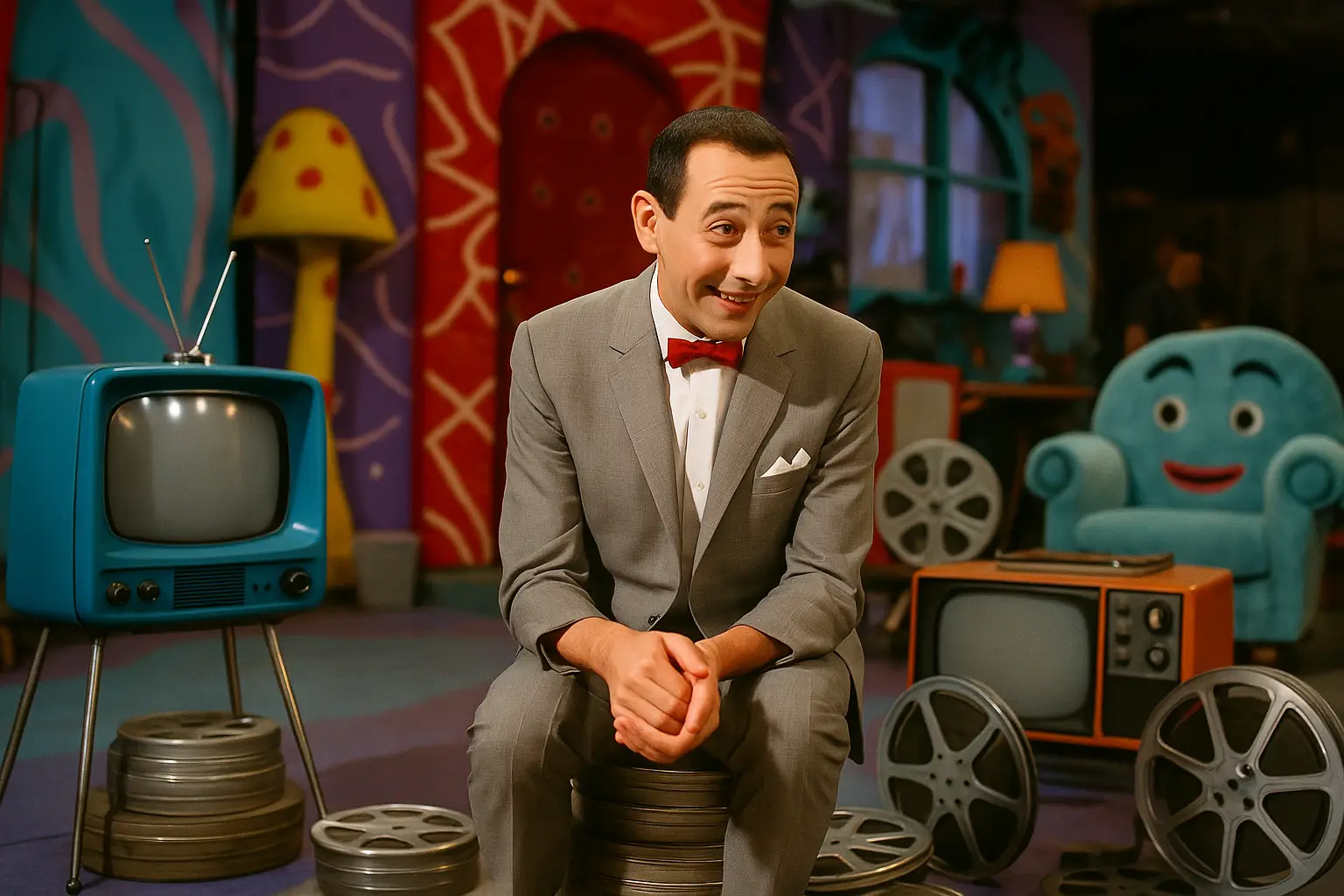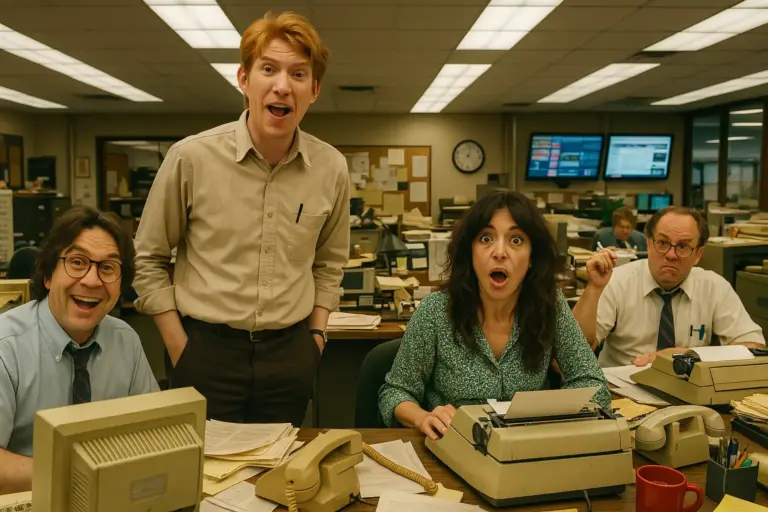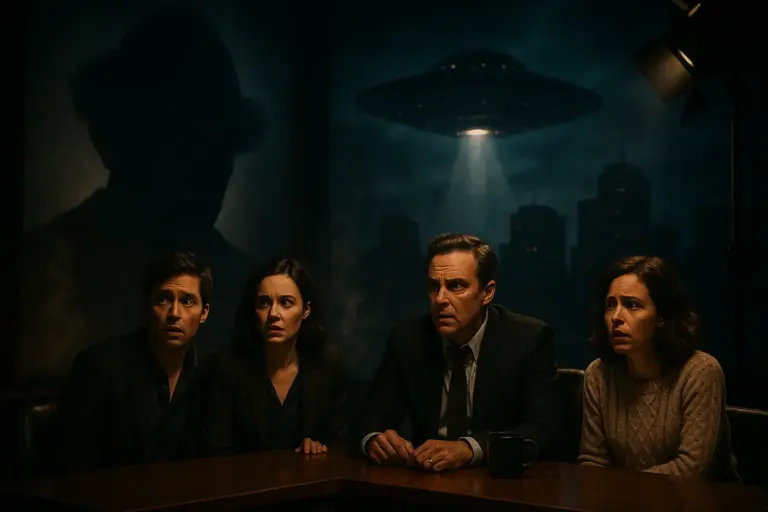The Making of “Pee-wee as Himself”
For those who remember the wild red bowtie and that unmistakable, mischievous giggle, “Pee-wee as Himself” invites viewers to peek behind the curtain. This two-part documentary series, directed by Matt Wolf, untangles both the legend of Pee-wee Herman and the winding journey of Paul Reubens himself. Slated to premiere on HBO and Max on May 23, 2025, the series offers much more than just nostalgia. It promises an exploration into creativity, scandal, and the thin line between performance and reality.
The show’s basic details set the stage:
- Title: Pee-wee as Himself
- Director: Matt Wolf
- Release Date: May 23, 2025
- Network: HBO and Max
- Episodes: 2
- Genre: Documentary, Biography
- Rating: TV-MA
From the opening moments, the director reveals a treasure trove. The series draws from over 40 hours of interviews with Paul Reubens. These conversations, recorded before Reubens’ passing in 2023, add not only intimacy but raw personal insight. Archival footage and countless private photographs build a mosaic that feels both historical and urgent. The documentary leads us through Reubens’ journey from his childhood in Sarasota, Florida, to the grandeur and, eventually, the scandal of Pee-wee Herman mania. The cameras also linger on his darker chapters – legal troubles, relentless media scrutiny – never devolving into spectacle, but instead seeking understanding.
Critical Reception – Critics Weigh In
As of May 2025, critics appear almost unanimous in their approval. Rotten Tomatoes gives it a glowing 100% approval rating, pulled from twelve critic reviews. Meanwhile, Metacritic’s score hovers at 78 out of 100, signaling broadly favorable opinions. Reviewers point toward a growing appetite for nuanced, layered celebrity profiles, and “Pee-wee as Himself” looks set to rank alongside other acclaimed HBO docuseries focused on complicated comedic figures (metacritic.com).
But why is the show drawing such favorable reactions? Let’s dig further into what made this documentary resonate – and, for some, occasionally stumble.
Unpacking the Positives
1. In-Depth Exploration of Paul Reubens’ Life
Time and again, critics celebrate the exhaustive, intricate dive into Paul Reubens’ artistry. The documentary does not shy from contradiction; it embraces it. Viewers see the full scope – Reubens is by turns difficult and welcoming, juvenile and hauntingly reflective, both brilliant and vulnerable. The Hollywood Reporter notes the series stands tall among recent high-caliber documentaries exploring flawed comedic icons.
This angle propels the show way beyond a standard celebrity biography. Fans and newcomers alike find themselves entrenched in not just one story, but several coexisting truths.
2. Emotional Resonance – Joy and Melancholy Intertwine
Transitioning deftly between the playful and the solemn, the series captures the “push-pull between the private and the public, the real and the unreal,” as the Daily Beast writes. The narrative never grows maudlin. Instead, revelations flow side-by-side with moments that truly capture Reubens’ joy and sadness. You feel the elation of Pee-wee’s wild success. Then, the vulnerability creeps in, as Reubens bares his soul about fame’s double-edged sword.
These contrasts enrich the experience, pushing viewers to ponder identity, performance, and longing in ways that few documentaries about comedians have dared.
3. Incredible Archival Material
If you love footage where time seems to stand still – a single snapshot unlocking an entire era – then this documentary delivers. Matt Wolf had unparalleled access to private archives crammed with never-before-seen photos and video. Salon praises the “countless photographs, hours of archival footage, and more,” assembled “shrewdly” to trace Reubens’ journey.
The result feels like flipping through an old, thumbed-through scrapbook, with every detail carefully curated. Not only does this build authenticity, but it makes the viewing experience immersive and satisfyingly rich.
Considering the Negatives
1. Length and Pacing – A Marathon for Some
While many celebrate the depth on display, not everyone has the stamina for it. Some reviewers, like those at Gazettely, warn that the two-part documentary “may feel long” and “require patience.” If you’re more of a casual viewer, or if your schedule only allows for brief watching stints, you might find the experience a bit overwhelming.
Because every moment holds weight and context, some scenes might need more breathing room – or trimming. So, pacing can become a hurdle, making commitment essential.
2. Unresolved and Complex Themes
Complexity enriches a story, but can also leave viewers unsatisfied if not brought to a satisfying resolution. Gazettely points out that certain themes – such as Reubens’ struggle with media vilification or deeper aspects of his personal life – are touched upon but not fully dissected.
Yes, this approach mirrors reality; life leaves questions hanging. Yet, in a documentary format, a little more closure might help some audience members connect dots that currently just float in the ether.
3. Power Struggle – Control Dynamics Between Director and Subject
One narrative thread runs parallel to the documentary itself: Who controls the story? Salon describes visible tension—”friction between the filmmaker and his subject”—as Reubens repeatedly asserts ownership over his narrative.
For some, this adds depth, presenting a meta-story about the very nature of storytelling. For others, however, the dynamic may feel distracting, pulling focus from Reubens’ life back to the choices behind the camera.
Three Key Positives:
- Penetrating, nuanced exploration of Paul Reubens’ artistry and contradictions
- Emotional swings between delight and real sorrow, making the story more universal
- Rich, immersive archival media (photos, home movies, and audio) that transport viewers
Three Key Negatives:
- Extended runtime and deliberate pacing may lose less-committed viewers
- Complex themes sometimes remain unresolved, leaving questions floating
- Evident tug-of-war over narrative control can momentarily distract or frustrate
The Story, The Man, The Myth
As the documentary unwinds, one thing becomes glaringly clear: “Pee-wee as Himself” refuses to simplify its subject. Whether it’s young Reubens’ avant-garde education in California or his creative eruptions as both writer and performer, the layers peel and peel.
The serene, sometimes mournful interviews evoke a man touched by success, yet battered by expectation. It’s moving to see Reubens, in his final recorded words, wrestle with his place in comedy – and in memory. HBO and Matt Wolf gamble by keeping their lens honest, even during difficult confessions, and critics argue this risk pays dividends.
So, is the show a passive nostalgia trip? Not in the slightest. There’s too much tension. Too much heart. Too much at stake.
Verdict: Pee-wee as Himself (2025) BRNG?
Is “Pee-wee as Himself” boring? The answer, when you weigh the evidence, comes back a clear “no.” For fans of character-driven biographies, or for curious viewers yearning for a more profound understanding of fame, vulnerability, and reinvention, this documentary delivers.
Certainly, the show demands your attention and some patience. It’s dense. It’s layered. At times, it asks you to sit with discomfort. But that’s what pulls you in.
When measured on a boredom scale – where “0” is so dull you’d only use it as background noise and “10” glues your eyes to the screen – the series easily lands at 8.6.
You won’t laugh at every moment. Nor will every scene offer closure. But you’ll come away with a sharper, fuller picture of Paul Reubens, the creative force known as Pee-wee Herman.
Whether you’re a longtime fan or a curious newcomer, “Pee-wee as Himself” is worth the ride – fascinating, unsettling, poignant, and, above all, never boring.





